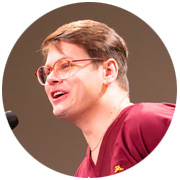As a graduate of this program, you will be prepared to take the national licensure exam to become a registered nurse. Graduates are eligible for certification in public health nursing in Minnesota.
What makes our program distinct?
The school partners with more than 250 health and community organizations to provide students with exceptional supervised clinical experiences. As a student, you will have a range of learning experiences to further develop your skills, perspectives and understanding of the continuum of care provided by nurses.
Students in the Master of Nursing program represent a rich diversity of educational and professional backgrounds. Some bring prior experience as teachers, artists, attorneys, business people, technicians and more. This makes the MN experience one of great energy, openness and collaboration.
Graduates are well-prepared to enter the nursing field and pursue further education leading to careers in teaching, research or advanced practice nursing.
Length of time to degree completion
The Master of Nursing (MN) degree takes 16 months (4 consecutive semesters) to complete. It requires enrollment during a summer semester and is offered as a full-time program. Admission is only offered for students to start in the fall semester.
Timing and commitment
The program is offered through on-campus, day courses that meet weekly. The practicum (clinical) schedule varies. Practicum experiences can take place early morning, late evening, overnight and on weekends. It is strongly recommended that students do not work while in the program and also have access to transportation (i.e. car or public transportation).
Prerequisites
The first step in applying to the program is to understand the prerequisites. There are nine prerequisites for the Master of Nursing program, and you must have five completed for your application to be considered. Learn more on our Prerequisites page
Curriculum and practicum experiences
The MN degree provides students an exceptional preparation for a nursing career through the curriculum requirements. The curriculum is complimented with approximately 500 required practicum hours.
For your last semester, you may indicate the type of clinical settings you prefer. The school will make an effort to place you in a setting that matches your preference. This gives you a chance to explore an area of particular interest to you such as public health nursing, care of critically ill children or adults in hospital and home care settings, maternal child nursing or a variety of other specialty areas that might include cardiac, surgical or neurological.
Early admission option for current University of Minnesota Crookston, Duluth, Morris and Rochester students
Junior status (61-90 credits) at UMN Crookston, UMN Duluth, UMN Morris, or UMN Rochester with intent to graduate with a non-nursing degree the following year
Completed 5 of 9 prerequisite courses for the Master of Nursing program by the end of fall semester junior year
Minimum cumulative GPA of 3.5; minimum prerequisite GPA of 3.7
The application for early decision for admission opens on January 15 and closes on March 15.
Accreditation
The Master of Nursing program at the University of Minnesota is accredited by the:
Commission on Collegiate Nursing Education
655 K Street NW, Suite 750
Washington, DC 20001
202-877-6791
Application deadline information
- Priority Deadline: December 17th, 2024
- Applicants with a verified application at the priority deadline can anticipate receiving a decision by early March.
- Applications verified after December 17th will be considered on a rolling basis and as such the application could shift to waitlist consideration only or close at any time if enrollment capacity is reached.
